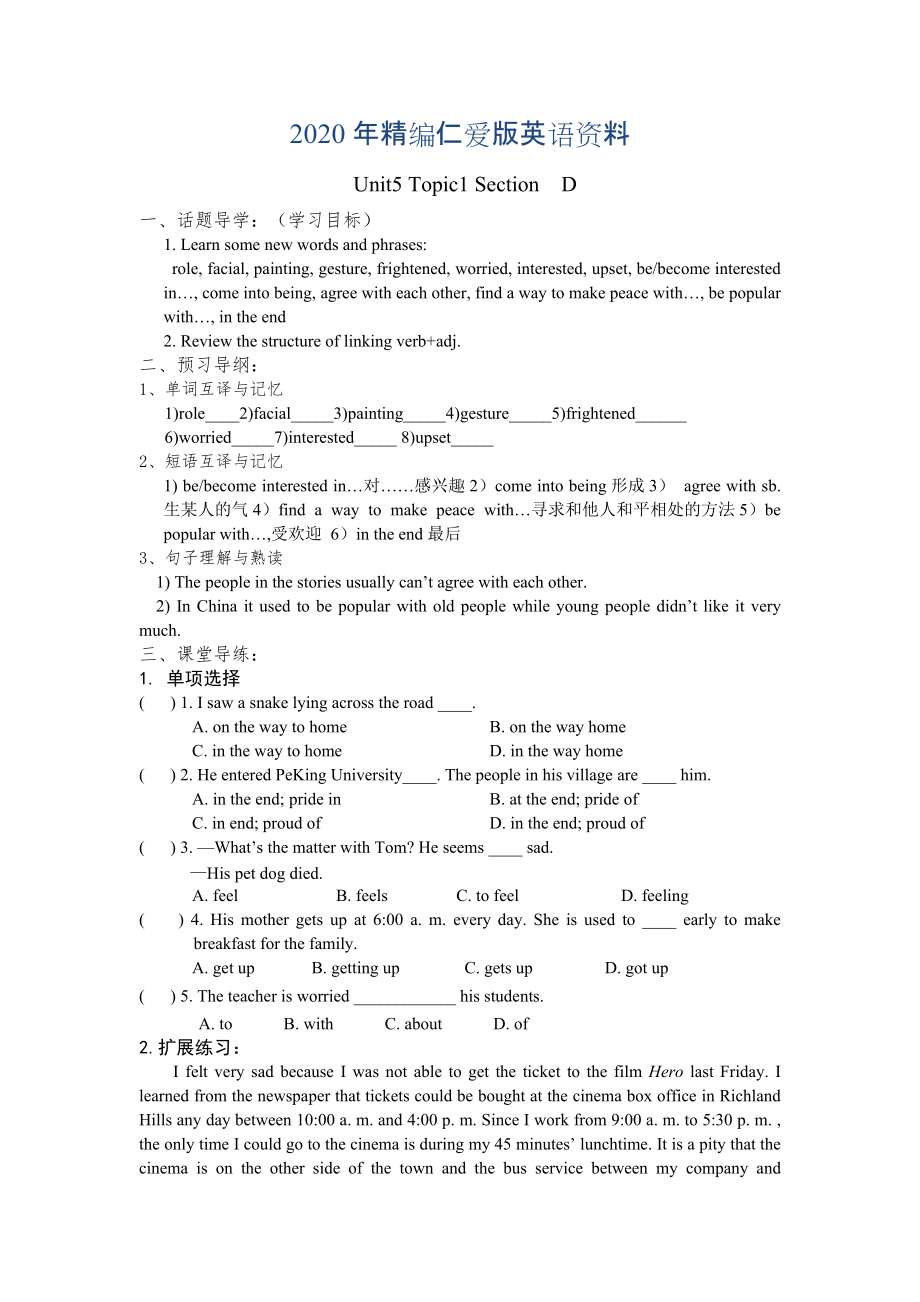《2020年仁愛(ài)版八年級(jí)英語(yǔ)下Unit 5第4課時(shí)Topic1 SectionD導(dǎo)學(xué)案》由會(huì)員分享���,可在線閱讀�����,更多相關(guān)《2020年仁愛(ài)版八年級(jí)英語(yǔ)下Unit 5第4課時(shí)Topic1 SectionD導(dǎo)學(xué)案(3頁(yè)珍藏版)》請(qǐng)?jiān)谘b配圖網(wǎng)上搜索��。
1���、2020年精編仁愛(ài)版英語(yǔ)資料
Unit5 Topic1 Section D
一�����、話題導(dǎo)學(xué):(學(xué)習(xí)目標(biāo))
1. Learn some new words and phrases:
role, facial, painting, gesture, frightened, worried, interested, upset, be/become interested in…, come into being, agree with each other, find a way to make peace with…, be popular with…, in the end
2.
2�、Review the structure of linking verb+adj.
二���、預(yù)習(xí)導(dǎo)綱:
1�、單詞互譯與記憶
1)role____2)facial_____3)painting_____4)gesture_____5)frightened______
6)worried_____7)interested_____ 8)upset_____
2����、短語(yǔ)互譯與記憶
1) be/become interested in…對(duì)……感興趣2)come into being形成3) agree with sb.生某人的氣4)find a way to make peace with…尋求
3、和他人和平相處的方法5)be popular with…,受歡迎 6)in the end最后
3�、句子理解與熟讀
1) The people in the stories usually can’t agree with each other.
2) In China it used to be popular with old people while young people didn’t like it very much.
三、課堂導(dǎo)練:
1. 單項(xiàng)選擇
( ) 1. I saw a snake lying across the road ____.
A. o
4�����、n the way to home B. on the way home
C. in the way to home D. in the way home
( ) 2. He entered PeKing University____. The people in his village are ____ him.
A. in the end; pride in B. at the end; pride of
C. in end; proud of D. in the end; proud of
( ) 3. —What’s the matter with Tom?
5��、 He seems ____ sad.
—His pet dog died.
A. feel B. feels C. to feel D. feeling
( ) 4. His mother gets up at 6:00 a. m. every day. She is used to ____ early to make breakfast for the family.
A. get up B. getting up C. gets up D. got up
( ) 5. The teacher is worried ____________ his studen
6、ts.
A. to B. with C. about D. of
2.擴(kuò)展練習(xí):
I felt very sad because I was not able to get the ticket to the film Hero last Friday. I learned from the newspaper that tickets could be bought at the cinema box office in Richland Hills any day between 10:00 a. m. and 4:00 p. m. Si
7�、nce I work from 9:00 a. m. to 5:30 p. m. , the only time I could go to the cinema is during my 45 minutes’ lunchtime. It is a pity that the cinema is on the other side of the town and the bus service between my company and Richland Hills is not very good. But if you are lucky, you can make the round
8、 trip in 45 minutes.
Last Monday, I stood at the bus stop for 15 minutes waiting for a bus. By the time I saw one come round the corner, there was not enough time left to make the trip, so I had to go back. The same thing happened on Tuesday, and again on Wednesday. On Thursday my luck changed. I
9����、got on a bus right away and arrived at the cinema in twenty minutes. But when I got there, I found a long line of people at the box office. I heard one man said he had been waiting in line for over an hour. I found I would not have enough time to wait in line. I caught the next bus and went back acr
10、oss the town.
By Friday I understood my only hope was to make the trip by car. It was expensive, but I felt it would be worth it to see the film. The trip by car only took 10 minutes, but it felt like an hour to me. When I reached the cinema, I was delighted to see that nobody was waiting in line.
11���、But I quickly found out that it was because they had already sold out all the tickets.
( ) 1. It seemed that the writer of the story works as a ____.
A. worker B. doctor C. farmer D. clerk
( ) 2. The writer tried to go to the cinema every day, but really got there ____.
A. five times B.
12��、 three times C. four times D. twice
( ) 3. We can infer from the underlined sentence that the writer was ____.
A. worried B. sorry C. surprised D. pleased
( ) 4. In the end the writer got ____ ticket(s).
A. one B. two C. three D. no
( ) 5. When the writer reached the cinema, he was de
13�、lighted because ____.
A. he understood
B. it was expensive, but he felt it would be worth it to see the film
C. the trip by car only took 10 minutes
D. he saw that nobody was waiting in line
四����、復(fù)習(xí)自測(cè):
看圖填詞:
When you feel ___1__, tears will come down ___2__ your eyes. When you are happy, es
14�����、pecially when you ____3__ hard, tears will also come down from your eyes. But tears have a more important job than ___4___ your feelings.
Tears ___5__ your eyes clean and healthy. They ___6___ away dirt and germs(細(xì)菌) just like bath. Your eyes also need tears to keep them wet. And eyes must be wet
15����、__7__ that they can move smoothly. Your eyes are ___8__ looking here and there all day long. They move quickly from one thing to __9___. If you didn’t have tears, your eyes couldn’t move, and soon you would be blind.
Maybe you don’t like tears, but your eyes can’t do ___10___ them.
1._____ 2.__
16、____ 3.______ 4._______ 5.______
6._____ 7.______ 8._______ 9.______ 10.______
五�����、課文解讀
1) The people in the stories usually can’t agree with each other. 故事里的人彼此不同意對(duì)方的看法。agree with sb.同意某人的看法
2) In China it used to be popular with old people while young people didn’t like it very much.
在中國(guó)��,過(guò)去歌劇很
17�����、受老年人的歡迎��,然而年輕人卻非常不喜歡��。
be popular with…受歡迎
六�����、評(píng)價(jià)
內(nèi)容
等級(jí)
自評(píng)
小組長(zhǎng)評(píng)價(jià)
預(yù)習(xí)情況
A
B
C
D
課堂表現(xiàn)
A
B
C
D
小組合作
A
B
C
D
Section D
二��、1�����、1)角色2)面部的 3)油畫(huà) 4) 手勢(shì) 5)驚嚇的 6)擔(dān)心的
7)感興趣的 8)心煩的
三����、1�����、1-5 BDCBC
2��、1-5 DDADD
四�、1.sad 2.from 3.laugh 4.showing 5.keep
6.wash 7.so 8.busy 9.another 10.without
 2020年仁愛(ài)版八年級(jí)英語(yǔ)下Unit 5第4課時(shí)Topic1 SectionD導(dǎo)學(xué)案
2020年仁愛(ài)版八年級(jí)英語(yǔ)下Unit 5第4課時(shí)Topic1 SectionD導(dǎo)學(xué)案

